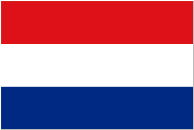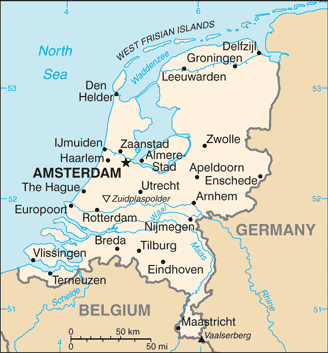Table of Contents
| Location and Size | Credit and Collections |
| Government | Risk Assessment |
| Legal System | Business Climate |
| People | Business Protocol |
| Economy | |
| Comparative Indicators |
12345
Location and Size
The Netherlands borders the North Sea on the west and north, Belgium on the south, and Germany on the east. Almost 20% of the total area of the Netherlands is water. Its capital and largest city, Amsterdam, is located in the province of North-Holland, a western province of the Netherlands.
Government
The Netherlands has a constitutional monarchy comprised of 12 provinces. The branches of government are as follows:
- Executive: Chief of State: King Willem-Alexander; Head of Government: Prime Minister Mark Rutte; Cabinet: Council of Ministers appointed by the monarch
- Legislative: Bicameral: States General, Staten General, consists of the First Chamber, or Eerste Kamer (75 seats; members indirectly elected by the country’s 12 provincial councils to serve four-year terms) and the Second Chamber, or Tweede Kamer (150 seats; members elected by popular vote to serve four-year terms – at most)
- Judicial: Highest court: Supreme Court, or Hoge Raad (consists of 41 judges: the president, 6 vice-presidents, 31 justices (raadsheren), and 3 justices in exceptional service (buitengewone dienst); the court is divided into criminal, civil, tax, and ombuds chambers)
Legal System
Netherlands’ legal system is based on a civil law system incorporating French penal theory. The constitution does not permit judicial review of acts of the States General. There are no commercial courts. Therefore, all matters, including payment disputes, are heard in the civil courts.
The country accepts compulsory International Court of Justice (ICJ) jurisdiction declaration with reservations. It accepts International Criminal Court (ICC) jurisdiction.
People
- Population: 17,234,326 (2023 est.)
- Population growth rate: 0.38% (2023)
- Languages: Dutch (official); note – Frisian is an official language in Fryslan province; Frisian, Low Saxon, Limburgish, Romani, and Yiddish have protected status under the European Charter for Regional or Minority Languages; Dutch is the official language of the three special municipalities of the Caribbean Netherlands; English is a recognized regional language on Sint Eustatius and Saba; Papiamento is a recognized regional language on Bonaire
- Literacy: 99% (2023 est.)
- Ethnic Make-up: Dutch 75.4%, EU (excluding Dutch) 6.4%, Turkish 2.4%, Moroccan 2.4%, Surinamese 2.1%, Indonesian 2%, other 9.3% (2023 est.)
- Religions: Roman Catholic 20.1%, Protestant 14.8% (includes Dutch Reformed, Protestant Church of The Netherlands, Calvinist), Muslim 5%, other 5.9% (includes Hindu, Buddhist, Jewish), none 54.1% (2023 est.)
Economy
The economy of the Netherlands, which ranks as the fifth-largest in the euro-zone, is open, prosperous and heavily dependent on the international financial sector and international trade.
Although the economic fundamentals remain sound, the country was significantly impacted by the financial crisis. The priority in government has shifted towards fiscal consolidation and reforms within the labor market.
Leading Markets (2023): Germany 24.2%, Belgium 10.7%, France 8.8%, UK 8.8%, Italy 4.2%
Leading Exports – Commodities: Machinery and equipment, chemicals, mineral fuels, food and livestock, manufactured goods
Leading Suppliers (2023): China 16.4%, Germany 15.3%, Belgium 8.5%, US 6.9%, UK 5.1%, Russia 4.3%,
Leading Imports – Commodities: Machinery and transport equipment, chemicals, fuels, foodstuffs, clothing
Top Industries: Agro-industries, metal and engineering products, electrical machinery and equipment, chemicals, petroleum, construction, microelectronics, fishing
Top Agricultural Products: Vegetables, ornamentals, diary, poultry and livestock products; propagation materials
Comparative Economic Indicators – 2023
| Netherlands | Belgium | Denmark | France | Germany | UK | |
| Population (millions)* | 17.2 | 11.57 | 5.81 | 67.36 | 80.45 | 65.1 |
| Population growth rate (%) * | 0.38 | 0.67 | 0.59 | 0.37 | -0.17 | 0.51 |
|
Age Structure (%)
(15 to 64 years old) |
64.6 | 64.0 | 64.0 | 61.7 | 64.81 | 64.22 |
|
Age Structure (%)
(64+ years old) |
19.1 | 18.8 | 19.4 | 19.8 | 22.36 | 18.9 |
| Literacy (%) | 99.0 | 99.0 | 99.0 | 99.0 | 99.0 | 99.0 |
| Unemployment rate (%) | 4.9 | 7.1 | 5.7 | 9.4 | 3.8 | 4.4 |
| Inflation (%) | 1.3 | 2.2 | 1.1 | 1.2 | 1.7 | 2.7 |
| Population below poverty line (%) | 8.8 | 15.1 | 13.4 | 14.2 | 16.7 | 15.0 |
| GDP** (USD billions) | 924.4 | 529.2 | 287.8 | 2,856.0 | 4,199.0 | 2,925.0 |
| GDP real growth rate (%) | 2.9 | 1.7 | 2.3 | 2.3 | 2.5 | 1.7 |
| GDP per capita** (USD) | 53,900 | 46,600 | 50,100 | 44,100 | 50,800 | 44,300 |
| Public debt (% of GDP) | 56.5 | 103.4 | 35.3 | 96.8 | 63.9 | 87.5 |
| Industrial production growth rate (%) | 3.3 | -0.8 | 2.5 | 2 | 3.3 | 3.4 |
| Exports (USD billions) | 555.6 | 300.8 | 113.6 | 549.9 | 1,434.0 | 411.2 |
| Imports (USD billions) | 453.8 | 300.4 | 94.93 | 601.7 | 1,135.0 | 615.9 |
| Reserves of foreign exchange and gold | 38.44 | 16.67 | 75.25 | 184.5 | 200.1 | 150.8 |
| Currency | Antillian Gilder ANG |
Euro EUR |
Krone DKK |
Euro EUR |
Euro EUR |
Pound GBP |
| Exchange rates (per USD) 05/30/2023 | 1.88 | 0.8 | 8.7 | 0.8 | 0.8 | 0.79 |
| Exchange rates (per EUR) 05/30/2023 | 2.09 | n/a | 9.7 | n/a | n/a | 0.88 |
Economic Data from CIA World Factbook
Credit and Collections
Dispute Resolution
Apart from an extensive arbitration system, governed by national and international law, there are several possibilities for extra-judicial dispute resolution in the Netherlands. Binding advice (“binding third-party ruling”) and mediation are the most important.
The Netherlands is a party to the New York Convention on the Recognition and Enforcement of Foreign Arbitral Awards. Arbitral awards given in the territory of member states can, therefore, be enforced in the Netherlands.
Risk Assessment
Coface Country Rating: A1 — The overall risk is a combination of business-specific factors and factors relating to the country in which the business operates. The analyses use a seven-level ranking. In ascending order of risk, these are: A1, A2, A3, A4, B, C and D.
Coface Business Climate Rating: A1 — Evaluating the business environment involves measuring the quality of a country’s private sector governance – in other words businesses’ financial transparency and the effectiveness of the courts in settling debts. Evaluations use a seven-level ranking. In ascending order of risk these are: A1, A2, A3, A4, B, C and D.
Business Climate
An important European transportation hub, the Netherlands’ economy is marked by stable industrial relations, moderate unemployment and inflation.
The country complies with European Union reciprocity provisions in banking and investment services. Provisions related to government incentives, national rules of incorporation, and access to the capital market are all administered on a non-discriminatory basis. Business laws and regulations are in accordance with international legal practices and standards, and apply equally to foreign and Dutch companies.
The Netherlands trade and investment policy is among the most open in the world.
Despite predominantly favorable business and investment conditions, relatively high wage costs, heavy administrative burdens, infrastructure issues and a relatively inflexible labor market are potential bottlenecks in attracting foreign direct investment to the Netherlands.
Economic Freedom: According to the 2023 Index of Economic Freedom, The Netherlands’ economic freedom score is 78, making its economy the 8th freest in the 2023 Index. The Netherlands is ranked 5th out of 44 countries in the Europe region.
Market Access: The Netherlands maintains no preferential or discriminatory export or import policies, with the exception of those that result from its membership in the European Union. It also abides by all internationally agreed strategic trade controls. Domestic restrictions on foreign investment are minimal.
Regulatory System: Laws and regulations that affect direct investment, such as environmental rules, and health and safety regulations, are non-discriminatory and apply equally to foreign and domestic firms.
Intellectual Property Rights: The Netherlands has a generally strong set of laws and regulations that protect intellectual property rights (IPR). However, the enforcement of anti-piracy laws remains a concern to producers of software and digital media. The Netherlands belongs to the World Intellectual Property Organization (WIPO), is a signatory to the Paris Convention for the Protection of Industrial Property, and conforms to accepted international practice for the protection of technology and trademarks.
Exchange Control: Dutch financial markets are fully developed and operate at market rates, facilitating the free flow of financial resources. The Netherlands is an international financial center for the foreign exchange market and for Eurobonds and bullion trade. The flexibility that foreign companies enjoy in conducting business in the Netherlands extends into the area of currency and foreign exchange. There are no restrictions on foreign investors’ access to sources of local finance.
Corruption: The Netherlands signed and ratified the UN Convention against Corruption and is party to the OECD Convention on Combating Bribery of Foreign Public Officials in International Business Transactions. Anti-bribery legislation makes corruption by Dutch businessmen in landing foreign contracts a penal offense, and bribes are no longer deductible for corporate tax purposes.
Business Protocol
- Business dress is usually dark and conservative with white shirts or blouses. Avoid colorful, busy ties and scarves.
- Business cards and other materials can be printed in English and normally don’t need to be translated into Dutch.
- The Dutch take a long-term perspective when looking at business, so be clear as to what your company’s intentions are.
- The Dutch value their personal time. If you want to foster a good working relationship, do not expect them to work late or over a weekend.
- Communication is direct. They do not use hyperbole and expect to be told yes or no clearly.
- Punctuality for meetings is taken extremely seriously. If you expect to be delayed, telephone immediately and offer an explanation. Cancelling a meeting at the last minute could jeopardize your business relationship.
- Decision-making is consensus driven. Anyone who might be affected is consulted, which can greatly increase the time involved in reaching a final decision.
**********
Subscribe to the Credit-to-Cash Advisor
Monthly e-Newsletter — It’s Free
This information is provided by ABC-Amega Inc. Providing international receivable management and debt collection services for exporters to more than 200 countries. For further information, contact [email protected].

